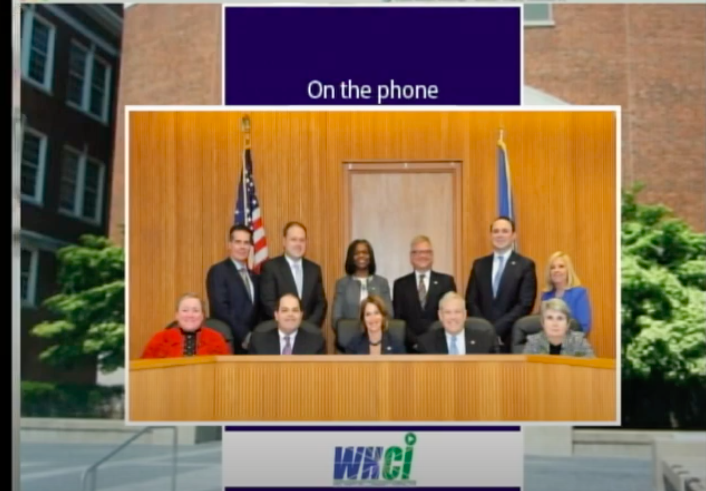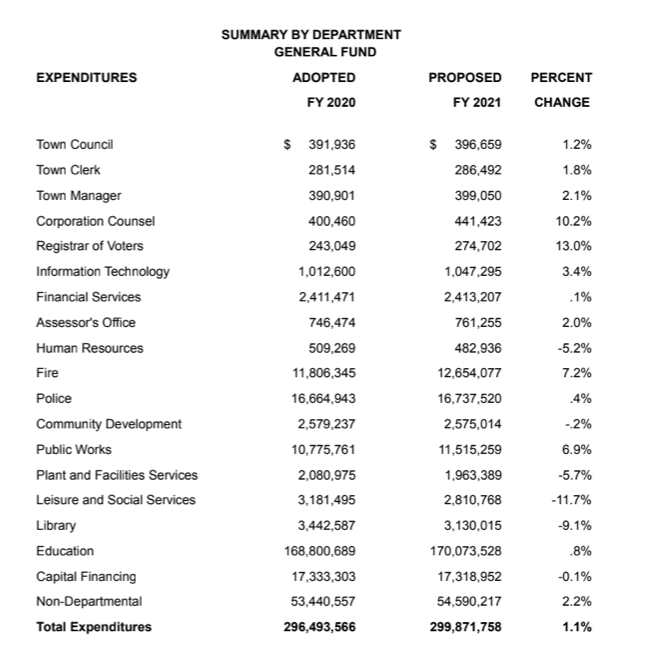Residents Request Town Council Maintain Library Funding

Audio By Carbonatix

The West Hartford Town Council held a virtual public hearing on the FY2021 budget. Screenshot
The West Hartford Town Council held its second of two public hearings last week, and heard from a handful and received dozens of emails from residents who requested that funding be maintained for the libraries.
By Ronni Newton
The West Hartford Town Council held its second virtual public hearing on the FY2021 budget last Thursday, and the five residents who spoke – by phoning in to the meeting – all asked that Council members reconsider cuts to the town’s libraries that had been proposed in budget amendments offered by Town Council Matt Hart on April 20.
Mayor Shari Cantor and the Council had asked Hart to lower or reduce the town’s mill rate for the upcoming fiscal year, and he proposed a menu of budget cuts, including a reduction in temporary payroll totaling $845,222. That reduction would cut the West Hartford Libraries budget by $312,572, or 9.1% of the department’s overall budget. The cut would lead to the reduction of services and hours at the library’s three branches.

In addition to those who spoke, more than 50 residents also emailed the Council with their comments requesting library funding be maintained for the upcoming fiscal year. Some residents also asked that funding for other programs remain in the budget.
“I am calling to tell you how utterly dismayed I am about the proposed cuts to the library and social services in particular,” resident Ann Mione said by phone at the public hearing. “Drastic cuts in operating hours, services and staff will make it so much harder for the public to access what the library has to offer,” and this is a time when the library’s services, as well as mental health services will be most needed.
Some other departments are getting small increases, Mione said, questioning the need for a 10.2% increase in the Corporation Counsel’s budget (which translates to roughly $40,000).
Resident Rupesh Parajuli noted the importance of the libraries to the immigrant community in West Hartford who may need to access the computers there for services such as applying for citizenship.
As the country likely is entering a recession, resident Michael Sullivan said there will be greater reliance on the library, which is currently fielding thousands of calls, texts, and emails as the headquarters of the town’s emergency operations. Proposed cuts to the libraries are the second highest of all departments (Leisure and Social Services is facing proposed cuts of 11.7%), and Sullivan said West Hartford’s libraries are already leaner than those in most other similar towns.
Sullivan said that the Town Council has made two rounds of severe cuts to the libraries already in the past few decades and has not restored the funding, and he fears these cuts will be permanent as well.
“I strongly object to the persistent and consistent diminishment of the funds for the library,” resident Nancy Jensen said. She said the library is an important hub for people of all ages.
“I can’t think of a worse way to try to save money,” said Jensen.
Jon Moss expressed his support for the Board of Education’s budget and said students will need extra support as they transition back to school after digital learning, and also asked the Council to ensure funding for the library.
While some may want to be lean with the budget, Moss said, “We need to continue to invest in our town.” Libraries are important for students, and provide access for all residents, he said.
At the first public hearing on the budget, held April 27, just three residents called in to speak, but written testimony was also encouraged, and to date nearly 60 residents or taxpayers have taken advantage of the opportunity to email Council members with their comments.
The written comments, which are available for viewing by the public on the town’s website, overwhelmingly express concern about cutting the library budget.
Most note concern that services available at the libraries will be needed more than ever before as economic pressures on residents continue to increase.
Residents Susannah McAndrew Chen wrote in her email that the libraries will need to make changes to ensure staff and patron safety, which could result in additional costs, and with the proposed budget reductions hours will need to be cut dramatically, perhaps eliminating Sunday and evening or morning hours at the Noah Webster, Faxon, and Bishops Corner branches.
“And this is where I must protest. During economic downturns, libraries become more – not less – important,” Chen wrote. “Libraries provide books and other media that households lack funds to buy; internet access, computers, and printing; job search assistance; and many other services that households are more likely to seek out. In uncertain times, libraries are also a source of hope, whether as a quiet place to study to improve oneself, to look for a job, to lay the foundations of early literacy, or to find a good book to momentarily ‘escape.’”
She said she fears that removing access to libraries will add to the divide between those who can afford access to technology, and the senior digital divide.
“While the number of books circulated has declined over the past few years, the use of the libraries as centers of community has grown,” wrote Tracey Wilson, a resident and former teacher who is the town’s historian. “For those who do not have internet access, for those who don’t have computers, for those who are learning English, for those unemployed, these institutions are necessities, and in fact need more hours to accommodate those in need and those who use the services. This is a small ‘d’ democratic institution that deserves bipartisan support.
“Saving $14 on an average tax bill for 2020 seems hardly right when I see what will happen to the libraries. At least restore that $14 per taxable property to the budget,” Wilson wrote
In addition to the written comments focused primarily on maintaining library services, several expressed support for maintaining education, social service, and public safety funding, and for ensuring town departments have adequate PPE.
The proposed General Fund budget the Town Council is currently considering, which incorporates the amendments presented by Hart at the virtual Town Council meeting April 20, now totals $299,871,758, and the proposed mill rate is 41.74 mills – a reduction of .06 mills (0.14%) from the current FY2020 rate of 41.8 mills. For the “average” homeowner, the annual tax saving from the amended budget will be $14.73.
The Board of Education unanimously adopted its budget on April 28, and added back $228,000 of the $4.6 million in cuts that Moore had presented at a workshop on April 21. While the Town Council cannot make decisions about individual items in the Board of Education budget, it can adjust the overall appropriation.
The Town Council is still tentatively planning to schedule its budget vote for May 12, but based on permitted changes to the budget adoption process outlined by Gov. Ned Lamont’s executive orders, has until May 26 to adopt it.
Mayor Shari Cantor said at the April 30 hearing that there is still much work to be done on the budget, and a line-by-line review will continue. All meetings are public and can be viewed online through WHCi. Details and links to meeting information can be found on the town’s website.
“Please keep your comments coming,” Cantor said. Any West Hartford resident or taxpayer may submit a written comment via email to [email protected].
Like what you see here? Click here to subscribe to We-Ha’s newsletter so you’ll always be in the know about what’s happening in West Hartford! Click the blue button below to become a supporter of We-Ha.com and our efforts to continue producing quality journalism.




[…] proposed cuts to the library budget, and to return $100,000 to facilities. The Council had received testimony, by phone as well as through email, from well over 50 residents requesting that library se…, programming, and hours be maintained, particularly at a time when residents are suffering […]